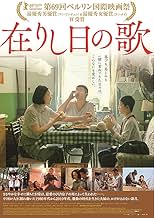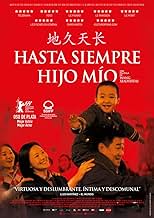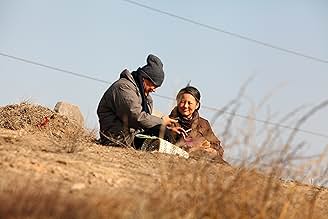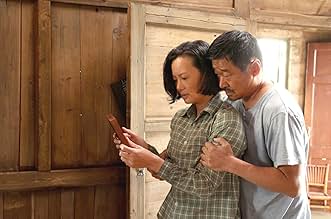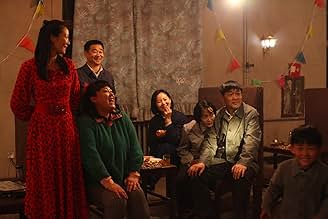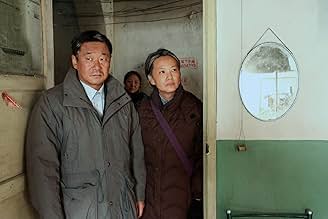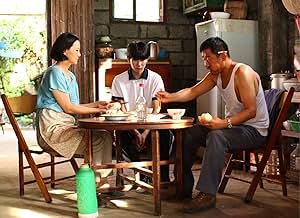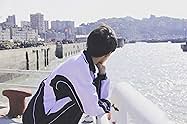Di jiu tian chang
- 2019
- 3 घं 5 मि
IMDb रेटिंग
7.7/10
5.9 हज़ार
आपकी रेटिंग
अपनी भाषा में प्लॉट जोड़ेंTwo married couples adjust to the vast social and economic changes taking place in China from the 1980s to the present.Two married couples adjust to the vast social and economic changes taking place in China from the 1980s to the present.Two married couples adjust to the vast social and economic changes taking place in China from the 1980s to the present.
- पुरस्कार
- 43 जीत और कुल 60 नामांकन
Yanguozhang Zhao
- Xinjian Zhang
- (as Yangouzhang Zhao)
फ़ीचर्ड समीक्षाएं
From China, a masterpiece."So Long, My Son" is an epic account of two families dealing with the trials and tribulations of life in China from the 1980's to the present and is the kind of confident, heartfelt drama many Western filmmakers can only dream about. This is a family saga worthy of Ozu but perhaps even more grounded and down-to-earth, superbly acted by everyone, (leads Jingchun Wang and Mei Yong won Best Actor and Actress at Berlin and deservedly so), superbly shot on a large canvas by Hyun Seok Kim and brilliantly direced by Xiaoshuai Wang. It may not be the easiest film to follow; Wang doesn't tell his tale in a linear fashion as we move back and forth in time as memories are triggered but then who said cinema has to be easy to follow.
Of course, this isn't just a family drama but a comment on Chinese society and is consequently an intimate epic and a beautifully realised political saga at the same time. The 'One Family, One Child' policy is at its core and it is this need for family and for human contact in general that dictates the film's structure. Wang alternates between long shots and close-ups to emphasise the distance between the characters just as the use of colour and music, and naturally make-up, delineate the passage of time. The film begins with a death and death is never far from its surface and yet it's never sentimental but at times almost unbearably moviing. Like I say, a masterpiece and one of the finest films of recent years.
Of course, this isn't just a family drama but a comment on Chinese society and is consequently an intimate epic and a beautifully realised political saga at the same time. The 'One Family, One Child' policy is at its core and it is this need for family and for human contact in general that dictates the film's structure. Wang alternates between long shots and close-ups to emphasise the distance between the characters just as the use of colour and music, and naturally make-up, delineate the passage of time. The film begins with a death and death is never far from its surface and yet it's never sentimental but at times almost unbearably moviing. Like I say, a masterpiece and one of the finest films of recent years.
What a beautiful story about what it means to be a parent in this world and how we are all connected.
The story is told by jumping back and forth in time, a flow of scenes giving the viewer a glimpse of the changes in the life of a couple who lost their son and how they try to move on with this loss. Although they abondon old friends after the incident a connection remains and in the end the lives of this group of people comes full circle.
This film brings the message of everyone being connected to another and the importance to sincerely care about others to the screen in such a wonderful way with an incredible cast. The three hours felt so short but something still remains, just like in life when one is touched by the goodness of others.
Highly recommend this movie.
The story is told by jumping back and forth in time, a flow of scenes giving the viewer a glimpse of the changes in the life of a couple who lost their son and how they try to move on with this loss. Although they abondon old friends after the incident a connection remains and in the end the lives of this group of people comes full circle.
This film brings the message of everyone being connected to another and the importance to sincerely care about others to the screen in such a wonderful way with an incredible cast. The three hours felt so short but something still remains, just like in life when one is touched by the goodness of others.
Highly recommend this movie.
Chinese film 'So Long, my Son' opens with Yaoyun and Liyun, a couple in an industralised town during the 1980s, suffering a great personal tragedy. Some years later they have left their hometown and are living with their son in a port. Some years later still and they are returning for the first time to their hometown in order to see a dying friend. The gaps in-between are filled in by multiple flashbacks, during which we see the human costs of China's environmentally-sensible one-child policy; how the authorities attempt to crush personal expression; and the ramifications of Yaoyun and Liyun's tragedy.
All these flashbacks are difficult to keep track of, especially as they are not in chronological order. So from that aspect this is a film that would probably reward repeated viewing. Certainly I would be happy to see it again; as played by Jingchun Wang and Mei Yong, respectively, Yaoyun and Liyun are a likeable couple. Their circle of friends may be less well-developed, consisting of stock characters such as the fun-loving party girl, the free spirit and the blindly-loyal Party functionary, but they all add colour to the story. I also enjoyed the depiction of China's transformation and development over the two decades covered by the film.
I saw this in the cinema during the 2019 London Film Festival. While I certainly recommend it, I suggest waiting until you can watch it in your own home: at three hours long you will want to be as comfortable as you possibly can be!
All these flashbacks are difficult to keep track of, especially as they are not in chronological order. So from that aspect this is a film that would probably reward repeated viewing. Certainly I would be happy to see it again; as played by Jingchun Wang and Mei Yong, respectively, Yaoyun and Liyun are a likeable couple. Their circle of friends may be less well-developed, consisting of stock characters such as the fun-loving party girl, the free spirit and the blindly-loyal Party functionary, but they all add colour to the story. I also enjoyed the depiction of China's transformation and development over the two decades covered by the film.
I saw this in the cinema during the 2019 London Film Festival. While I certainly recommend it, I suggest waiting until you can watch it in your own home: at three hours long you will want to be as comfortable as you possibly can be!
Saw this at the Berlinale 2019, where it was part of the official Competition. Two prizes were awarded: Silver Bear for Best Actor (Wang Jingchun) and one Silver Bear for Best Actress (Yong Mei). Apart from the acting, it was very interesting to see China transform in thirty years time, albeit that we see only a rural part of China, far away from the big city centers, thus avoiding large scale business and touristic areas.
Showing China while undergoing a drastic change, is one of the main themes of this movie, if not the main one. From a side line we get to see the transformation in progress, going from a communist country towards modern (semi?) capitalism. Factories, workplaces and houses the people work and live in, seem carefully designed to be true to the reality of the times at hand, thereby demonstrating an admirable attention for details.
A perfect example was the factory closure. The gathering with the workers was very illustrative. It showed that such things went in communist times exactly as how it goes nowadays. The workers assembled can protest and find that the director must be sent away. The harsh reality was (of course) in communist times exactly as in our capitalist times. Jobloss overcomes the humble workers, as if it was a natural disaster. There is nothing they can do about it, regardless of all being called "comrades". Neither can help be found in communist textbooks and the principles of "worker's self management".
On the other hand, regarding the implicit second theme, the family related stories of the protagonists, the developments were difficult to follow for me. This was partly due to some unnecessary time jumps and flash backs, partly caused by not telling who-is-who when a new protagonist appears, partly because of me being unable to tell Chinese people apart. Though the story starts with a fatal drowning accident, the people involved will re-unite in the end and will live happily ever after, even when the real truth comes out thirty years later, and even after someone admits having played a dark role in the accident.
It is no problem to sit out the three hours this movie lasts, though not really involving on a human level. And it was certainly not moving or heart-breaking as per what other reviewers wrote. The ground cause for this psychological distance is (see above) the difficulties I had to follow the persons involved, besides the fact that their logic was failing on me a few times.
All in all, I was glad to have seen this movie, regardless of my problems with following the various personal story lines and their interwoven connections. The nearly three hours are easy to sit through, so no problem there. And the ending was a surprise (no details, no spoilers), particularly because it did not cause a hard break in relationships, despite there would have been ample reason for a break-up after admitting a few 30-year-old lies.
Showing China while undergoing a drastic change, is one of the main themes of this movie, if not the main one. From a side line we get to see the transformation in progress, going from a communist country towards modern (semi?) capitalism. Factories, workplaces and houses the people work and live in, seem carefully designed to be true to the reality of the times at hand, thereby demonstrating an admirable attention for details.
A perfect example was the factory closure. The gathering with the workers was very illustrative. It showed that such things went in communist times exactly as how it goes nowadays. The workers assembled can protest and find that the director must be sent away. The harsh reality was (of course) in communist times exactly as in our capitalist times. Jobloss overcomes the humble workers, as if it was a natural disaster. There is nothing they can do about it, regardless of all being called "comrades". Neither can help be found in communist textbooks and the principles of "worker's self management".
On the other hand, regarding the implicit second theme, the family related stories of the protagonists, the developments were difficult to follow for me. This was partly due to some unnecessary time jumps and flash backs, partly caused by not telling who-is-who when a new protagonist appears, partly because of me being unable to tell Chinese people apart. Though the story starts with a fatal drowning accident, the people involved will re-unite in the end and will live happily ever after, even when the real truth comes out thirty years later, and even after someone admits having played a dark role in the accident.
It is no problem to sit out the three hours this movie lasts, though not really involving on a human level. And it was certainly not moving or heart-breaking as per what other reviewers wrote. The ground cause for this psychological distance is (see above) the difficulties I had to follow the persons involved, besides the fact that their logic was failing on me a few times.
All in all, I was glad to have seen this movie, regardless of my problems with following the various personal story lines and their interwoven connections. The nearly three hours are easy to sit through, so no problem there. And the ending was a surprise (no details, no spoilers), particularly because it did not cause a hard break in relationships, despite there would have been ample reason for a break-up after admitting a few 30-year-old lies.
This years we are witnissing something of a "Chinese new wave". "So long my son" was already the third Chinese film I saw this year (after "An elephant sitting still" (2018, Bo Hu) and "Long day's journey into night" (2018, Gan Bi)).
"So long my son" is the perfect sequel to "Lifetimes" (1994, Zhang Yimou). "Lifetimes" covers de period 1940 - 1970 in Chinese history and "So long my son" the period 1980 up till now. In "Lifetimes" the culrurel revolution is the most defining event, in "So long my son" it is the one child policy.
In "Lifetimes" the story is told in chronological order. "So long my son" jumps back and forth in time. Together with the many characters "So long my son" asks from his viewers that they keep paying attention. The one who does so is richly rewarded for this. Moreover the peculiar chronological order is in my opinion less artificial than in for example "Memento" (2000, Christoher Nolan). Some events in the film have such an emotional "gravity" that it is just natural that they disrupt the normal chronological order.
"So long my son" is in some ways critical to Chinese society. Apart from the one child policy and the damage it has done it shows the growing gap between rich and poor. The critisism mainly concerns however policies started by Deng Xiaoping. The widening of the distance between rich and poor is after all an indirect consequence of the open door policy (mixed state ruled and market economy) that was introduced in 1978.
"So long my son" says nothing about the surveillance state that Xi Jinping is building at the moment. Long it was thought that a more market oriented economy would lead by itself to a more liberal political system. This did not happen, and one can call that "The Chinese paradox". Now we have a smaller "Chinese paradox" in the movie industry, where the surveillance state does not preclude the already mentioned Chinese new wave.
"So long my son" is the perfect sequel to "Lifetimes" (1994, Zhang Yimou). "Lifetimes" covers de period 1940 - 1970 in Chinese history and "So long my son" the period 1980 up till now. In "Lifetimes" the culrurel revolution is the most defining event, in "So long my son" it is the one child policy.
In "Lifetimes" the story is told in chronological order. "So long my son" jumps back and forth in time. Together with the many characters "So long my son" asks from his viewers that they keep paying attention. The one who does so is richly rewarded for this. Moreover the peculiar chronological order is in my opinion less artificial than in for example "Memento" (2000, Christoher Nolan). Some events in the film have such an emotional "gravity" that it is just natural that they disrupt the normal chronological order.
"So long my son" is in some ways critical to Chinese society. Apart from the one child policy and the damage it has done it shows the growing gap between rich and poor. The critisism mainly concerns however policies started by Deng Xiaoping. The widening of the distance between rich and poor is after all an indirect consequence of the open door policy (mixed state ruled and market economy) that was introduced in 1978.
"So long my son" says nothing about the surveillance state that Xi Jinping is building at the moment. Long it was thought that a more market oriented economy would lead by itself to a more liberal political system. This did not happen, and one can call that "The Chinese paradox". Now we have a smaller "Chinese paradox" in the movie industry, where the surveillance state does not preclude the already mentioned Chinese new wave.
क्या आपको पता है
- ट्रिवियाThe film explores the consequences across three decades of China's onetime one-child policy which lasted from 1979-2013.
- गूफ़When Hao Shen's mother died, he wore a black cloth on his left arm. However, in most areas of China, especially in northern China, it is a folk custom for children to wear a black cloth on their right arm after the death of mother.
- कनेक्शनReferenced in Estrenos Críticos: Septiembre 2019 (2019)
- साउंडट्रैकAuld Lang Syne
Traditional tune, lyrics by Robert Burns
टॉप पसंद
रेटिंग देने के लिए साइन-इन करें और वैयक्तिकृत सुझावों के लिए वॉचलिस्ट करें
- How long is So Long, My Son?Alexa द्वारा संचालित
विवरण
- रिलीज़ की तारीख़
- कंट्री ऑफ़ ओरिजिन
- आधिकारिक साइटें
- भाषाएं
- इस रूप में भी जाना जाता है
- So Long, My Son
- फ़िल्माने की जगहें
- उत्पादन कंपनियां
- IMDbPro पर और कंपनी क्रेडिट देखें
बॉक्स ऑफ़िस
- दुनिया भर में सकल
- $80,96,596
- चलने की अवधि3 घंटे 5 मिनट
- रंग
- पक्ष अनुपात
- 1.78 : 1
इस पेज में योगदान दें
किसी बदलाव का सुझाव दें या अनुपलब्ध कॉन्टेंट जोड़ें


![Trailer [OVS] देखें](https://m.media-amazon.com/images/M/MV5BZThlNmFjNjAtNjkwZS00NTU1LWJkM2ItZGIyNmVlZDRmMGM5XkEyXkFqcGdeQXRyYW5zY29kZS13b3JrZmxvdw@@._V1_QL75_UX500_CR0)
